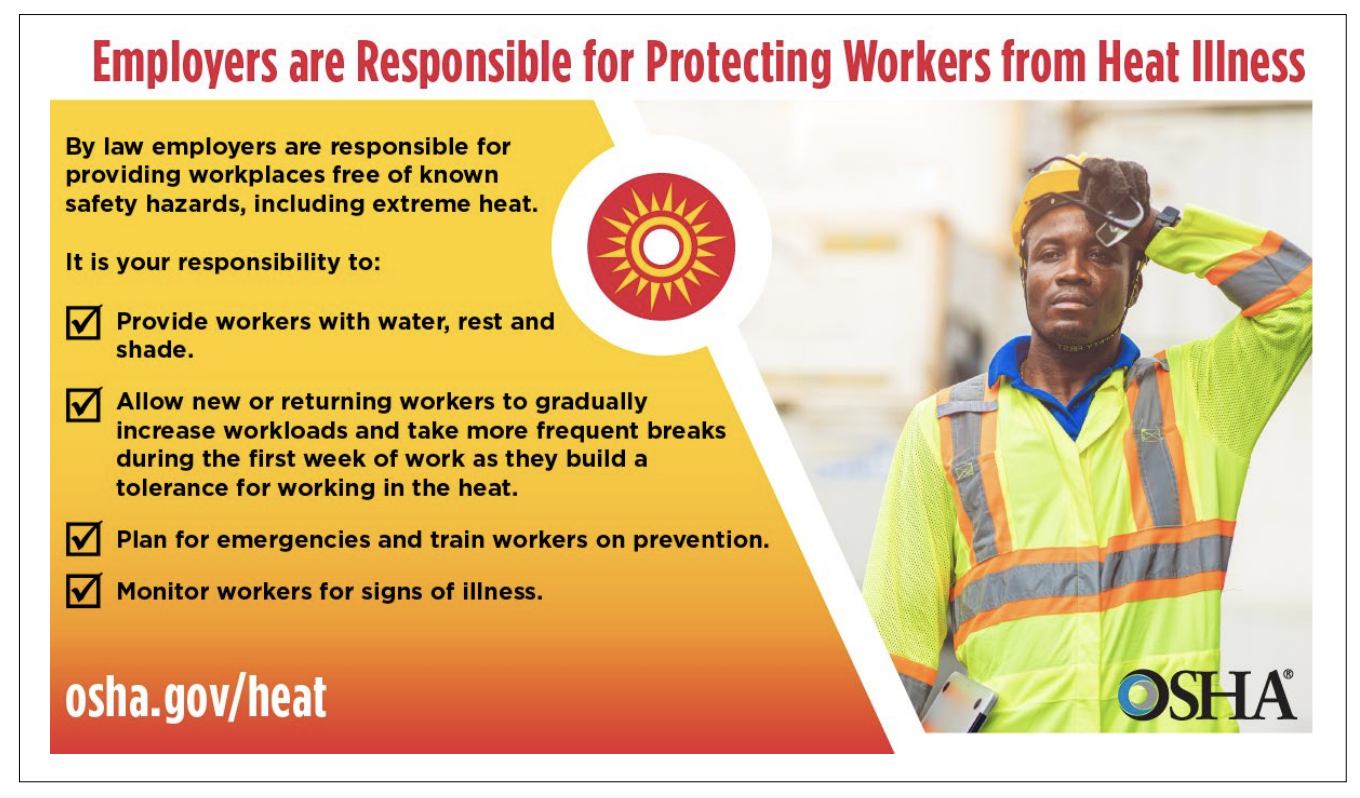OSHA Hazard Alert: Extreme Heat Can Be Deadly to Workers
Nearly 3 out of 4 workers who die from heat-related causes die in their first week on the job.
Most states are experiencing an unprecedented heat wave and the U.S. is on track for the hottest summer on record. Heat is a well-known and recognized occupational hazard for outdoor and indoor workers that can cause serious or fatal illness when they are not provided the necessary protections and training. Each year, thousands of workers become sick from occupational heat exposure, and too many of those illnesses result in fatalities.
New employees whose bodies have not had time to adjust to working in the heat are most vulnerable — nearly 3 out of 4 workers who die from heat-related causes die in their first week on the job.

Employer Responsibility
It’s the law! Employers have a duty to protect workers against heat. Employers have a legal and moral responsibility not to assign work in high heat conditions without protections in place for workers, where they could be literally worked to death.
This is true even in Texas, despite its recent law limiting local ordinances on heat illness protections.
- At a minimum, employers should provide adequate cool water, rest breaks, and shade or a cool rest area for employees.
- Give new or returning employees the chance to gradually acclimatize (or become used to working in hot temperatures), to be trained and plan for emergencies, and to monitor for heat signs/symptoms.
- Train employees on heat illness prevention, signs of heat illness, and how to act immediately if they or another employee appears to be suffering from a heat related illness.
Worker Rights
Every worker covered under the OSH Act has the right to a safe and healthful workplace. HAZARDALERT Workers can file a confidential complaint with OSHA if they believe their working conditions are unsafe or unhealthful, or if they think their employer is not following OSHA standards.
Complaints can be reported by calling OSHA at 800- 321-OSHA or filed online. It is illegal for any employer to fire or otherwise retaliate against a worker who complains to OSHA and uses their legal rights. Workers can exercise their rights to file a Whistleblower complaint within 30 days if they believe they have been retaliated against in any way.
Federal Enforcement
OSHA initiated a National Emphasis Program on heat in April 2022, and continues to focus enforcement efforts in geographic areas and industries with the most vulnerable workers. Many states have their own initiatives, and several have their own OSHA heat standards.
The Agency is planning enhanced enforcement actions, with a strategic focus on geographic locations and industries where high heat impacts vulnerable worker populations. This means more inspection activity as well as a broader use of enforcement tools, especially where workers are in clear danger.
OSHA will also be providing outreach and compliance assistance to ensure employers, including those not covered by the OSH Act, and worker organizations have the tools to protect workers from hazardous heat. OSHA is also diligently working towards publishing a proposed standard on heat illness prevention for indoor and outdoor workers.
We are currently in the Congressionally mandated Small Business Regulatory Flexibility Act process, to get feedback from small businesses on regulatory approaches under consideration.
Employers should immediately take all steps to protect workers from extreme heat. Learn more about how to protect workers from occupational heat hazards at osha.gov/heat. This hazard alert is not a standard or regulation, and it creates no new legal obligations. It contains recommendations as well as descriptions of mandatory safety and health standards. The recommendations are advisory in nature, informational in content, and are intended to assist employers in providing a safe and healthful workplace.
The Occupational Safety and Health Act requires employers to comply with safety and health standards and regulations promulgated by OSHA or by a state with an OSHA-approved state plan. In addition, the Act’s General Duty Clause, Section 5(a)(1), requires employers to provide their employees with a workplace free from recognized hazards likely to cause death or serious physical harm. HA-4279 07/2023 U.S. Department of Labor www.osha.gov
















